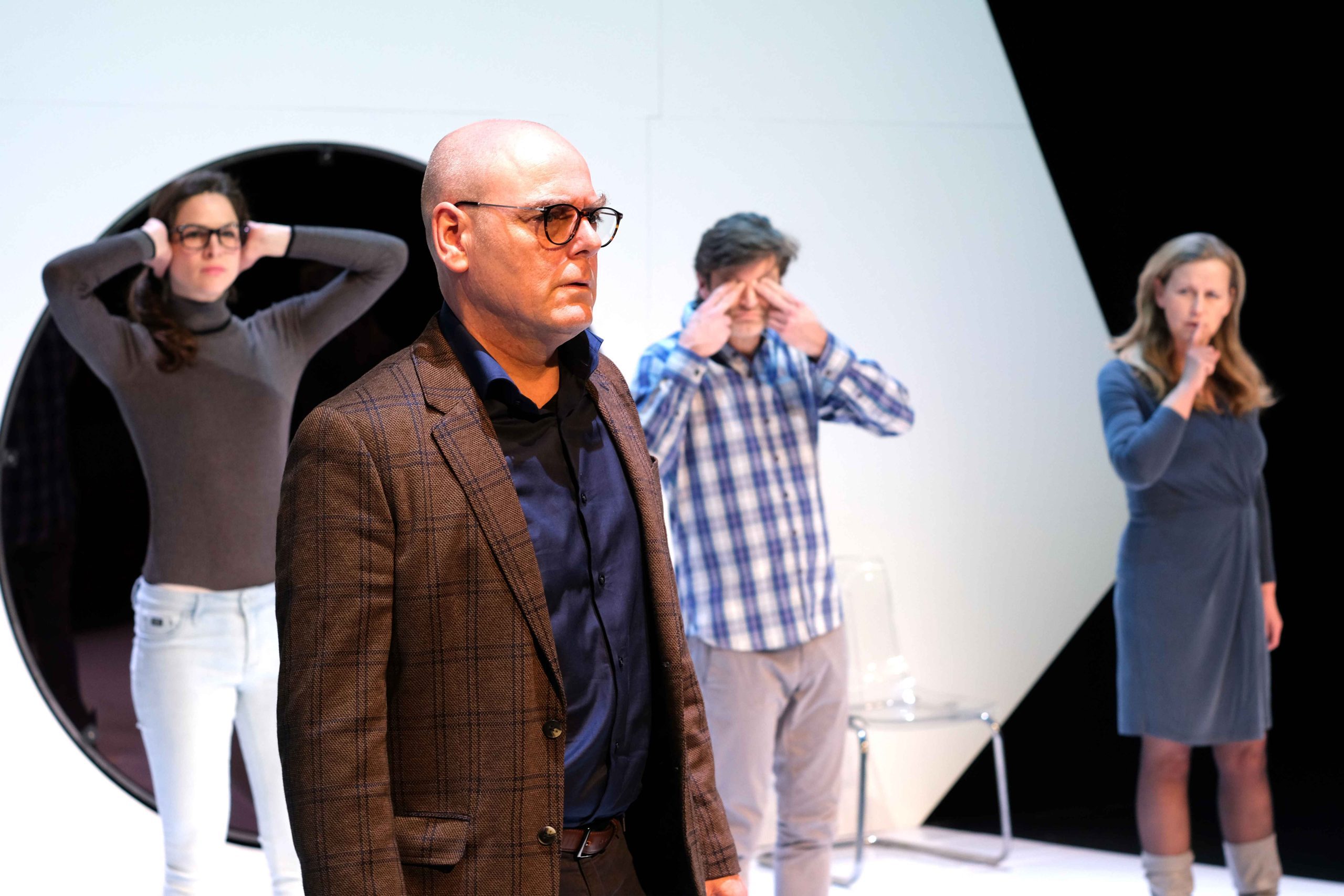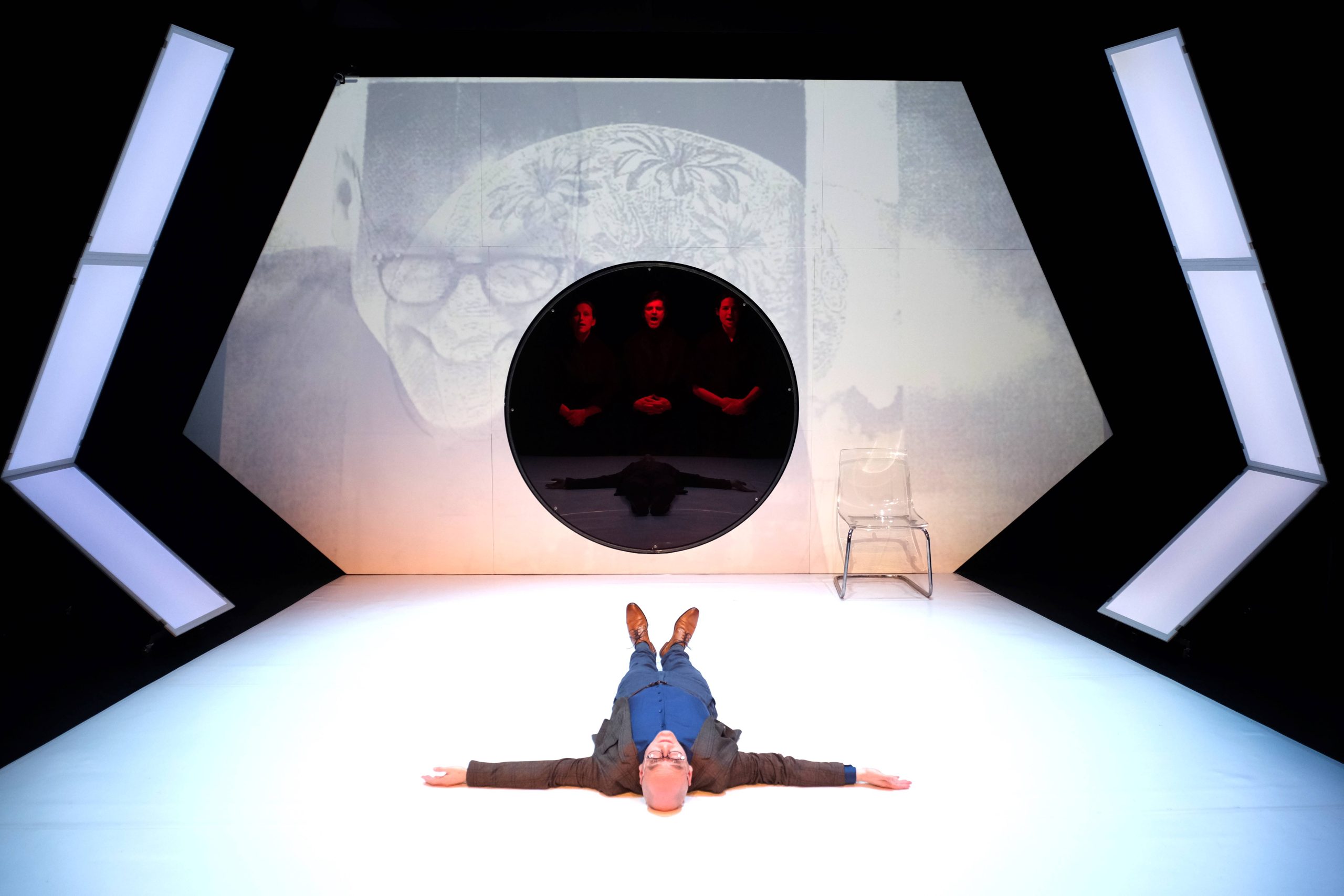As of Monday 11 November, all employees at TU Delft can go to the Mindlab performance on social safety. Not a quick fix, but intended to be a conversation starter, the producers say. “Make yourself important and treat yourself to a performance.”
From Monday 11 November, the play Mindlab will be performed in Delft (Photo: Theatermakers Radio Kootwijk)
What would happen if you stop cutting yourself off from the socially unacceptable situations around you? Or if the things that you have unconsciously closed your eyes to suddenly hit you hard – such as that strange email that your colleague received from a supervisor or the implicitly sexual comments that may not have been directed at you but you do hear? What if you can no longer ignore these occurrences and you do say something?
The main character in the Mindlab theatre play will experiment with this. He is neither victim nor perpetrator in social safety issues. As a bystander he sees the lack of safety at his university but does not give it words or deeds. Until he enters the lab.
From Monday, employees at TU Delft can get a glimpse into his mind. Between 11 and 22 November, Theatermakers Radio Kootwijk (TMRK, in Dutch) theatre producers will perform 12 times in the Lijm en Cultuur cultural centre. A second series will follow at the beginning of 2025.
Mindlab is a ‘science fiction thriller’
Walter Supèr, the artistic director of TMRK and the author of the play, thinks that it is brave of TU Delft to bring this performance about social safety to the university. “You can say whatever you want about the management, but this does show that they want to move forward.”
A lot of negative things
Anyone hoping that Mindlab will be a quick fix will be disappointed, the producers reiterate. They say that Mindlab is a ‘science fiction thriller’, ‘a theatre performance that touches the heart of academia’, and a ‘new reference point to talk about social safety’. The play is in Dutch and will be ‘subtitled’ in English.
The very idea for Mindlab was the brainchild of Ellen Giebels, Professor of Organisational Psychology at the University of Twente, in 2019. She approached the theatre producers, who already had experience in performances about current issues, and told them that there were a lot of negative things happening in the academic world, suggesting creating a performance.
They said yes and in the two years that followed, TMRK performed Mindlab at the University of Twente and Utrecht University. At the University of Twente, the play was seen as ‘striking, confrontational and recognisable’ (Utoday, in Dutch). DUB, Utrecht University’s newspaper, spoke of ‘scientists confronting themselves in the mirror’. More universities followed their lead; TU Delft will be the nineth.

For everyone
The producers based their play on interviews with dozens of employees at both institutions. Supèr says that they were from all layers of the universities, “From the services to the executive board. We believe that the performance should be for everyone at a university.”
‘We hope that people feel it’
So it is an aid and not a quick fix. How does that work? Daphne Goudsmit, TMRK’s Business Director, hopes that the performance will get under the skin. Simple recognition is not enough. “It needs to go further. We hope that people feel it. We hope that they want to take action, must take action even if they do not know exactly what to do.”
This does not make Mindlab unique, says Goudsmit, as this is always what a good theatre performance should do. You come away from a performance a different person than when you went in. Goudsmit says that “The funny thing is that when we go to the theatre, we want to have an enjoyable evening and talk about what we have seen afterwards. But if the setting is an organisation, it suddenly needs to have a label. Then it is referred to as an intervention or something along the lines of interaction or education.”
Artistic quality
Supèr, the play’s author, agrees. “The objective of Mindlab is not actually that different to any other art form that wants to touch people, move them, offer them new perspectives. The artistic quality is just as important to us.”
Goudsmit says that it feels like the benchmark for a performance like Mindlab is higher than for other types of performances. “The audience is more critical. They tend to think that if a university invests in this and that they can attend during working hours, it has to be worth it. But it should be seen as a gift if you are allowed to go to a performance!”
She also believes that if progress is to be made, Mindlab should not be an isolated event but be a part of a bigger story. It transpired that this was important in April when the theatre company performed Mindlab for the first time at TU Delft for an audience of administrators and managers. The crushing report inspectorate had been issued only a little more than a month before. ‘A precarious time’, Goudsmit says. She felt resistance and unease among the audience.

New insights
She recognises that this was logical in that stage of the process, and it did not make the performance any less valuable. “Every member of the audience held a position in the organisation in which they had to take action, and everyone felt something. The post-performance conversations also revealed new insights.”
The feedback at the time was that Mindlab would have great value if it were embedded in the larger whole. When this new series starts, it will be more than seven months since the Inspectorate of Education publicised its findings. Social safety has become the discussion and has therefore created a completely different context for Mindlab.
‘Do not turn a blind eye’
How can you ensure that the seed planted by Mindlab actually takes root? Goudsmit first suggests that the audience not immediately return to their desks, but talks about what they have seen. It starts with a plenary bit, so that everyone can sort out their thoughts. Afterwards, the talk is continued in groups of six with facilitators.
Part of it
Perpetrators and victims do not need to be named, he says. “This is not our role. We want to use art and theatre to connect people. So we target bystanders.” For Supèr this is a very interesting group. “If someone really transgresses someone else’s boundaries, it is usually clear that that is wrong. But the area around it is grey where people neither actively work on the lack of social safety nor on solutions. We want to address those people.” To put words into action, he says “Do not turn a blind eye. Do not just think about the reasons why you don’t need to join the discussion. You too are part of it.”
Goudsmit adds that it is easy to blame a system. “But a system is made up of individuals who make choices. So don’t underestimate your own role. Make yourself important and treat yourself to a performance.”
Supèr believes that Mindlab has had an impact on the universities where it has performed over the last couple of years. “We heard from the Universities of Twente, Utrecht and Eindhoven that things in their DNA have changed and that it has now become the norm to talk about social safety. But solving something completely takes time,” says Supèr. “This is why you need to continue the discussion. Mindlab should not only be a ticked box.”
Want to experience Mindlab?
Mindlab will be performed twelve times between Monday, November 11 and Friday, November 22 in Lijm & Cultuur, the cultural center on the Rotterdamseweg within biking and walking distance of the TU Delft campus.
The performances are intended for TU Delft employees. Some are reserved for particular faculties; at others all university employees are welcome. After the performance, follow-up interviews will take place.
– Check the website for exact times and more information. Registering can be done on the website as well.



Comments are closed.